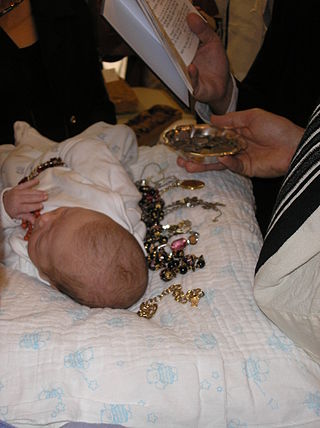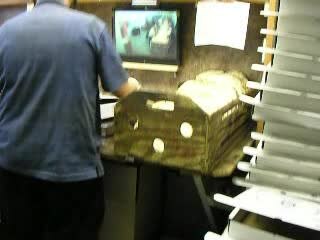
The omer offering, or the sheaf offering, was an offering (korban) made by the Jewish priests in the Temple in Jerusalem. The offering consisted of one omer of freshly harvested grain, and was waved in the Temple. It was offered on Passover, and signaled the beginning of the 49-day counting of the Omer, as well as permission to consume chadash.
Kohen is the Hebrew word for "priest", used in reference to the Aaronic priesthood, also called Aaronites or Aaronides. They are traditionally believed and halakhically required to be of direct patrilineal descent from the biblical Aaron, brother of Moses, and thus belong to the Tribe of Levi.

Kodashim is the fifth of the six orders, or major divisions, of the Mishnah, Tosefta and the Talmud, and deals largely with the services within the Temple in Jerusalem, its maintenance and design, the korbanot, or sacrificial offerings that were offered there, and other subjects related to these topics, as well as, notably, the topic of kosher slaughter.
In Judaism, the korban, also spelled qorban or corban, is any of a variety of sacrificial offerings described and commanded in the Torah. The plural form is korbanot, korbanoth, or korbanos.
Showbread, in the King James Version: shewbread, in a biblical or Jewish context, refers to the cakes or loaves of bread which were always present, on a specially-dedicated table, in the Temple in Jerusalem as an offering to God. An alternative, and more appropriate, translation would be presence bread, since the Bible requires that the bread be constantly in the presence of God.
A terumah, the priestly dues or heave offering, is a type of offering in Judaism. The word is generally used for offerings to God, but can also refer to gifts to a human.

Bemidbar, BeMidbar, B'midbar, Bamidbar, or Bamidbor, is the 34th weekly Torah portion in the annual Jewish cycle of Torah reading and the first in the Book of Numbers. The parashah tells of the census and the priests' duties. It constitutes Numbers 1:1–4:20. The parashah is made up of 7,393 Hebrew letters, 1,823 Hebrew words, 159 verses, and 263 lines in a Torah Scroll. Jews generally read it in May or early June.

Korach or Korah is the 38th weekly Torah portion in the annual Jewish cycle of Torah reading and the fifth in the Book of Numbers. It tells of Korach's failed attempt to overthrow Moses.
The second tithe is a tithe mentioned in the Hebrew Bible and practised within Orthodox Judaism. It is distinguished from the first tithe, the third or poor tithe, and the terumat hamaaser.

A burnt offering in Judaism is a form of sacrifice first described in the Hebrew Bible. As a tribute to God, a burnt offering was entirely burnt on the altar. This is in contrast to other forms of sacrifice, which was partly burnt and most of it eaten in communion at a sacrificial meal.
In Judaism, the presumption of priestly descent is the presumption that a Jewish man is a priest (kohen), based not on genealogical records of descent from Aaron or on Jewish court rulings, but rather by observation of his priestly behavior as recognized by his peers and community. Such an individual is called a kohen muhzak.
The firstborn or firstborn son is an important concept in Judaism. The role of firstborn son carries significance in the redemption of the first-born son, in the allocation of a double portion of the inheritance, and in the prophetic application of "firstborn" to the nation of Israel.

In Judaism, the dough offering is an assertive command requiring the owner of bread dough to give a part of the kneaded dough to a kohen. The obligation to separate the dough offering from the dough begins the moment the dough is kneaded, but may also be separated after the loaves are baked. This commandment is one of the twenty-four kohanic gifts, and, by a biblical injunction, is only obligatory in the Land of Israel, but from a rabbinic injunction applies also to breadstuffs made outside the Land of Israel.
According to Judaism, the priestly covenant is the biblical covenant that God gave to Aaron and his descendants, the kohanim. This covenant consisted of their exclusive right to serve in the Temple, and to consume sacrificial offerings and receive other priestly gifts.
A bat-kohen or bat kohen is the daughter of a kohen, who holds a special status in the Hebrew Bible and rabbinical texts. She is entitled to a number of rights and is encouraged to abide by specified requirements, for example, entitlement to consume some of the priestly gifts, and an increased value for her ketubah.
The Sons of Zadok are a family of priests (kohanim), descended from Zadok, described in the prophecies of Ezekiel.
In Judaism, the priestly court was a court of Jewish law, composed of priests descended from Aaron, which operated at the Temple in Jerusalem and oversaw matters related to the priesthood and Temple rituals.
In the Tanakh, the term herem is used, among other meanings, for an object or real property to be devoted to God, with God authorizing a kohen to be its receiving agent.
The priesthood of ancient Israel was the class of male individuals, who, according to the Hebrew Bible, were patrilineal descendants from Aaron, who served in the Tabernacle, Solomon's Temple and Second Temple until the destruction of Jerusalem in 70 CE. Their temple role included animal sacrifice. The priests are viewed as continuing in the Kohen families of rabbinical Judaism.
Zevachim is the first tractate of Seder Kodashim of the Mishnah, the Talmud and the Tosefta. This tractate discusses the topics related to the sacrificial system of the Temple in Jerusalem, namely the laws for animal and bird offerings, and the conditions which make them acceptable or not, as specified in the Torah, primarily in the book of Leviticus. The tractate has fourteen chapters divided into 101 mishnayot, or paragraphs. There is a Gemara – rabbinical commentary and analysis – for this tractate in the Babylonian Talmud, and no Gemara in the Jerusalem Talmud.





